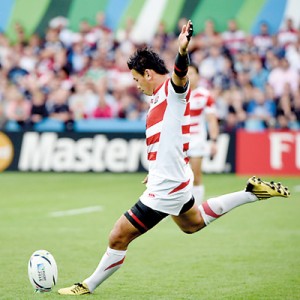Hard work and miracles in sport
View(s):A miracle was the call of a rugby buff in describing the victory of Japan over fancied South Africa. Conception then is a miracle forgetting that there is work done before formation. To attribute the victory of Japan to a miracle is an insult to the vision and the strategy adopted over the last few years, after they were selected to host the 2019 World Cup.
 Not that they did not have a plan before but the determination to succeed was more. Yet there is much more as they look at 2019 considering the defeat to Scotland in the second match. The old world of rugby was saved of embarrassment of two teams being defeated in a space of five days. Japan held a close lead at half time but lost it in the second half with the loss of the playmaker number 8 Amnaki Mafi . Having to play the second game after 3 days of rest and resultant fatigue too may have contributed to the defeat. This gives more breathing space for South Africa as well as Samoa as the group stands much open. To get up where it matters and to get the valuable gap between games requires occupying space at the top. It is indeed a hard climb.
Not that they did not have a plan before but the determination to succeed was more. Yet there is much more as they look at 2019 considering the defeat to Scotland in the second match. The old world of rugby was saved of embarrassment of two teams being defeated in a space of five days. Japan held a close lead at half time but lost it in the second half with the loss of the playmaker number 8 Amnaki Mafi . Having to play the second game after 3 days of rest and resultant fatigue too may have contributed to the defeat. This gives more breathing space for South Africa as well as Samoa as the group stands much open. To get up where it matters and to get the valuable gap between games requires occupying space at the top. It is indeed a hard climb.
Getting back to the win against South Africa will be good for World Rugby and an eye opener for the old order. If it was Argentina a few years back now it is Japan standing up to be recognised. It may be good for Asian rugby but a clear indication that Japan are far ahead of the rest. It may also mean that Japan might go on a two pronged attack. One is to stay on top with the world meeting better opposition to mark their progress. Their presence in Asia may help in the development of the next lower squad of Japan by exposing a development squad in Asia.
Going back to my first paragraph those who talk in terms of the Japanese win being a miracle possibly talks in comparison as to how we get about things. A team and a Coach put together a month before and then blow hot of competing in the international arena. Then we hype about our performance and wait till the next tournament is close at hand. That is what I call a miracle happening if and when we hit the top which is possible and we look beyond what we see over our nose.
A moment of truth and a moment to be revisited is that decision by the Japanese Captain in not going for three points and wanting a win is an indication of their preparation and hunger for a win that has eluded them for some time. The essence of leadership is what the next generation of players can take from that decision. Leader because of his desire to make a change is what we need to look at. This is different form managing the team which would have been in line with some established frame and settle for three points and a draw.
 Writing to BBC news; Seijiro Takeshita Professor of Management at University of Shizuoka and a former captain of a club had this to say: “So what led to this result? Japanese rugby has changed dramatically over the years, introducing many elements from abroad, not only in terms of foreign players, but also in ideas and styles of coaching and playing. We were rather late in catching up with the internationalised rugby scene, where national borders count for little”. “Also, the Japanese tend to have a strong tendency to collectivism. It is unlikely you would be able to create an individual hero, as it happens in US sports. Also, knowing rugby, a winger’s try could have come from the unnoticed efforts of a prop who robbed the ball in a maul. Some news sources are hailing Ayumu Goromaru (full-back and vice-captain) as a hero as he won 24 of Japan’s 32 points – but of course we too have those that take a more American view of the sport. At the end of the day, we praise the collective effort of the team, and the people surrounding and supporting it. That is very much the Japanese way”.
Writing to BBC news; Seijiro Takeshita Professor of Management at University of Shizuoka and a former captain of a club had this to say: “So what led to this result? Japanese rugby has changed dramatically over the years, introducing many elements from abroad, not only in terms of foreign players, but also in ideas and styles of coaching and playing. We were rather late in catching up with the internationalised rugby scene, where national borders count for little”. “Also, the Japanese tend to have a strong tendency to collectivism. It is unlikely you would be able to create an individual hero, as it happens in US sports. Also, knowing rugby, a winger’s try could have come from the unnoticed efforts of a prop who robbed the ball in a maul. Some news sources are hailing Ayumu Goromaru (full-back and vice-captain) as a hero as he won 24 of Japan’s 32 points – but of course we too have those that take a more American view of the sport. At the end of the day, we praise the collective effort of the team, and the people surrounding and supporting it. That is very much the Japanese way”.
The climb of rugby may set a new dimension of the team game and the collectivism that rugby is involved.
An important fact in writing is the acceptance of the introduction of many elements from abroad to the game which include players, coaches, referees etc. that has contributed to the change. This may be food for thought and a point to look ahead when we are getting ready for another season and are prompting an era of no foreign players. There are questions asked on the need for foreign coaches, referees and referee consultants. What we need to look at is the bigger picture as Japan has been seeing in designing the strategy to meet the objective of reaching to be among the best.
Can we at least see the future for Sri Lanka in Asia and what are we most suited for as it is now, whether it is sevens or fifteens. Can we shine more in sevens as we progress to the fifteens?
* Vimal Perera is a former player, coach, referee and an IRB Accredited Referees’ Educator


